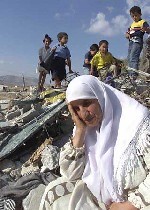The Electronic Intifada 29 August 2002

A Palestinian woman sits in front of a house destroyed by the Israeli army in the West bank village of Tubas on August 15, 2002. (Mahfouz Abu Turk/Reuters)
Until now, Israel has demolished 21 homes belonging to families of suspected Palestinians. These homes are inhabited by 41 families, hosting 169 residents, including 120 children. Since Israel started this punitive campaign, six neighboring homes have been demolished, causing severe damage to an additional 15 homes.
When an entire family is punished for the suspected deeds of one of its members through the destruction of its home, the arbitrary arrest of family members and possibly the expulsion of family members, there can be little doubt that the punishment is a collective one, primarily affecting people whose only crime is to be related to a person suspected. The punishment of individuals for an action for which they are not personally responsible is properly termed collective punishment.
Also during the previous intifada, Israeli occupation authorities have used this punitive measure as a methodical reprisal against individuals and their families. The demolition of homes of those who have not been tried, convicted, or even arrested, reinforces the conclusion that demolitions are an extra-judicial form of reprisal.
Destruction of property in occupied territories is forbidden under article 53 of the Fourth Geneva Convention. It constitutes collective punishment, which explicitly prohibited by article 33 of the Fourth Geneva Convention. It further constitutes extra-judicial punishment and arbitrary interference in home and property.
In 2001, Israel demolished a total of 349 Palestinian homes, of which 249 in the Gaza Strip, 64 in the West Bank and 46 in East Jerusalem. Since the beginning of this year, Israel has demolished 474 Palestinian homes, of which 166 in the Gaza Strip, 275 in the West Bank and 33 in East Jerusalem.
Related Links:


